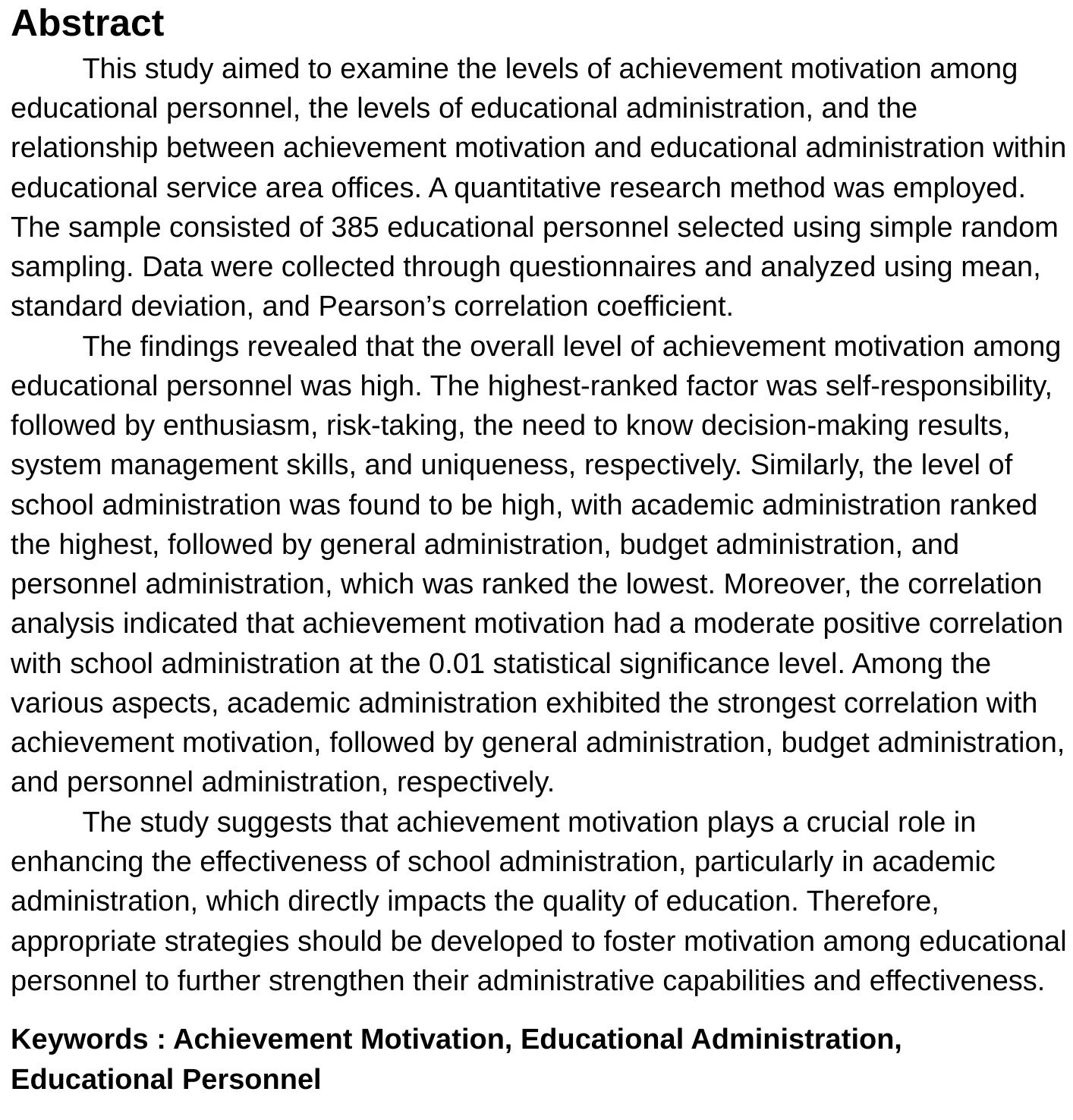Achievement Motivation and Educational Administration of Educational Personnel in Educational Service Area Offices
Keywords:
Achievement Motivation, Educational Administration, Educational PersonnelAbstract
This study aimed to examine the levels of achievement motivation among educational personnel, the levels of educational administration, and the relationship between achievement motivation and educational administration within educational service area offices. A quantitative research method was employed. The sample consisted of 385 educational personnel selected using simple random sampling. Data were collected through questionnaires and analyzed using mean, standard deviation, and Pearson’s correlation coefficient.
The findings revealed that the overall level of achievement motivation among educational personnel was high. The highest-ranked factor was self-responsibility, followed by enthusiasm, risk-taking, the need to know decision-making results, system management skills, and uniqueness, respectively. Similarly, the level of school administration was found to be high, with academic administration ranked the highest, followed by general administration, budget administration, and personnel administration, which was ranked the lowest. Moreover, the correlation analysis indicated that achievement motivation had a moderate positive correlation with school administration at the 0.01 statistical significance level. Among the various aspects, academic administration exhibited the strongest correlation with achievement motivation, followed by general administration, budget administration, and personnel administration, respectively.
The study suggests that achievement motivation plays a crucial role in enhancing the effectiveness of school administration, particularly in academic administration, which directly impacts the quality of education. Therefore, appropriate strategies should be developed to foster motivation among educational personnel to further strengthen their administrative capabilities and effectiveness.
References
ณัฏฐิกา บูรณกูล. (2552). ความสัมพันธ์ระหว่างแรงจูงใจใฝ่สัมฤทธิ์และค่านิยมในการทำงานกับพฤติกรรมการเป็นสมาชิกที่ดีขององค์การของครูโรงเรียนเอกชน ในอำเภอฝาง จังหวัดเชียงใหม่. การค้นคว้าแบบอิสระปริญญามหาบัณฑิต. มหาวิทยาลัยเชียงใหม่, สาขาวิชาจิตวิทยาอุตสาหกรรมและองค์การ.
ดรรชนี จิตคำรพ. (2561). แรงจูงใจใฝ่สัมฤทธิ์ในการปฏิบัติงานของผู้บริหารสถานศึกษา สังกัดสำนักงานเขตพื้นที่การศึกษามัธยมศึกษาเขต 16. ในการประชุมหาดใหญ่วิชาการระดับชาติและนานาชาติ ครั้งที่ 9. สงขลา: มหาวิทยาลัยหาดใหญ่.
ธัชยพงศ์ ปาละหงษา, วิชาญ เหรียณวิไลรัตน์ และในตะวัน กำหอม. (2565). ความสัมพันธ์ของปัจจัยเชิงสาเหตุกับประสิทธิผลการบริหารของบุคลากรทางการศึกษา โรงเรียนชุมชนประชาธิปัตย์วิทยาคาร สำนักงานเขตพื้นที่การศึกษาประถมศึกษาปทุมธานี เขต 2. วารสารวิชาการรัตนบุศย์, 4(3), 151-162.
ธีระ รุญเจริญ. (2550). ความเป็นมืออาชีพในการจัดและบริหารการศึกษา ยุคปฏิรูปการศึกษา. กรุงเทพฯ : ข้าวฟ่าง.
ในตะวัน กำหอม. (2559). การวิจัยทางการศึกษา.เล่ม 1. กรุงเทพฯ : วิทยาลัยทองสุข.
พีระกรณ์ ทะชิตะสิงห์, ศักดิ์สิทธิ์ ฤทธิลัน และสุพจน์ ดวงเนตร. (2566). การศึกษาความสัมพันธ์ระหว่างแรงจูงใจใฝ่สัมฤทธิ์ของผู้บริหารสถานศึกษากับบรรยากาศองค์การของโรงเรียนในสังกัดสำนักงานเขตพื้นที่การศึกษาประถมศึกษาสกลนคร เขต 1. วารสารมหาวิทยาลัยราชภัฏมหาสารคาม, 17(1), 201–216. สืบค้น จาก https://so05.tci-thaijo.org/index.php/rmuj/article/view/264347
ภารดี อนันต์นาวี. (2557). หลักการ แนวคิด ทฤษฎีทางการบริหารการศึกษา. (พิมพ์ครั้งที่ 4). ชลบุรี : มนตรี.
มรินทกาล พัฒนทรัพย์พิศาล. (2560). ปัจจัยการบริหารที่ส่งผลต่อประสิทธิผลโรงเรียน สังกัดสำนักงานเขตพื้นที่การศึกษามัธยมศึกษา เขต 23. วิทยานิพนธ์ปริญญามหาบัณฑิต สาขาวิชาการบริหารการศึกษา : มหาวิทยาลัยราชภัฏสกลนคร
สิริพร ยศธนวรกุล (2561) แรงจูงใจใฝ่สัมฤทธิ์ในการปฏิบัติงานของครูโรงเรียนวังน้ำเย็นวิทยาคมสังกัดสำนักงานเขตพื้นที่การศึกษามัธยมศึกษา เขต 7. วิทยานิพนธ์. คณะศึกษาศาสตร์ สาขาวิชาการบริหารการศึกษามหาวิทยาลัยบูรพา.
Bandura, A. (1997). Self-efficacy: The exercise of control. New York, NY: Freeman.
Gagne, M., & Deci, E. L. (2005). Self-determination theory and work motivation. Journal of Organizational Behavior, 26(4), 331-362. https://doi.org/10.1002/job.322
Herzberg, F. (1959). The motivation to work. New York, NY: John Wiley & Sons.
Krejcie, R.V. and Morgan, D.W. (1970). Determining Sample Size for Research Activities. Educational and Psychological Measurement, 30(3), 607–610.
Locke, E. A., & Latham, G. P. (1990). A theory of goal setting & task performance. Englewood Cliffs, NJ: Prentice Hall.
McClelland, D. C. (1961). The achieving society. Princeton, NJ: Van Nostrand.
Ryan, R. M., & Deci, E. L. (2000). Self-determination theory and the facilitation of intrinsic motivation, social development, and well-being. American Psychologist, 55(1), 68-78. https://doi.org/10.1037/0003-066X.55.1.68

Downloads
Published
How to Cite
Issue
Section
License
Copyright (c) 2025 Institute of Sufficiency Journal

This work is licensed under a Creative Commons Attribution-NonCommercial-NoDerivatives 4.0 International License.



